AI “art” is already encroaching on our comics spaces. There have been allegations of its use on well known mainstream properties; popular digital platforms host AI comics regardless; AI art comics-making apps are prevalent; arts institutions that should know better have offered generative AI comics-making courses; and perhaps most disappointingly established professionals have experimented/published using it. It remains an existential threat to creativity and to our comics community.
And supporting community is, of course, a large part of what Broken Frontier is about. So, with that in mind, some weeks back we put out a call on social media for contributions to a potential series of articles discussing the subject. To repeat our stance from that initial shout-out we’re not here to create “balance” on this issue. We’ve made it very clear where we stand at Broken Frontier on generative AI. This is about creating a record for posterity of the thoughts of those in our scene experiencing, or concerned about, the negative impact of the theft machine on their livelihoods, practice and the future of the form/industry in general.
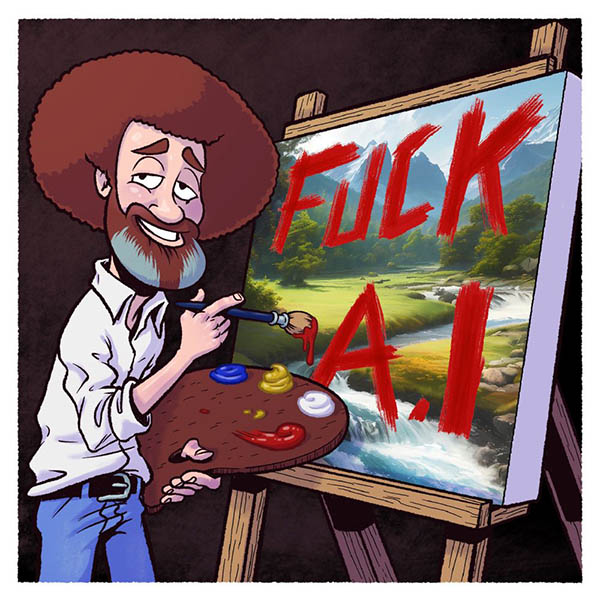
Art by James Lawrence
If you would like to contribute please refer to that guidelines article here. We would particularly like to hear from more actual comics artists to make this a broader and more relevant series! And don’t be concerned if your comments aren’t in this first part. We’re splitting things up into manageable reading chunks week by week. So here’s some thoughts on our first talking point: What are your greatest fears for the future of comics if the influence of Generative AI art goes unchecked?
Adam Karenina Sherif, academic historian and comics critic at The Beat: As a historian, I’m worried about the ways this technology’s going to be used to distort the past and our shared sense of record. Although the results of Generative AI currently bear telltale signs, their “quality” will improve which means eventually we’re going to be confronted with horrors like a “lost Ditko Spider-Man story” or “previously unseen Kirby Superman story”. And I’m worried about what we do collectively when we can’t tell for sure whether something’s real or fake.
With the prevalence of anti-critical thinking and anti-expert culture in the west, it’s going to be a mess. We can’t rely on tech companies or governments for safeguards and I’m not sure I’d bet on publishers either – so we have to talk to one another as a community to figure out how we navigate the dishonesty and disingenuousness this technology’s going to facilitate.
Chloe Starling, creator of Retrospective and co-organiser of inQ! Queer Comic Fair: If comics aren’t protected adequately from Gen AI this leads to a further devaluing of artists, writers, and creators. What will stop large publishers feeding their authors’ comics into Gen AI models without the author’s consent, or an individual style mimicked by Gen AI without any protections for the original creator?
When people are inspired by previous work, they build upon it and develop it in a human, organic way that moves the art form forward. But Gen AI simply uses algorithms and code to imitate art, spitting out cheap imitations made with no soul. If Gen AI is left to fester and grow out of control, it will end up in an infinite ouroboros, eating up other Gen AI works to create the same outputs over and over.
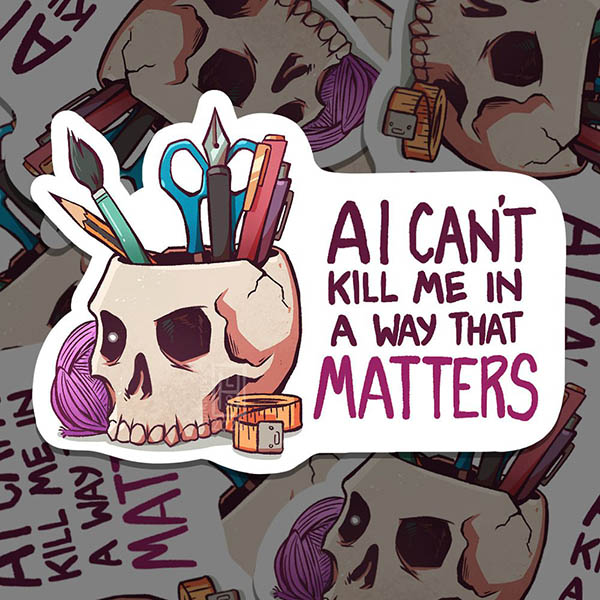
Art by Spikings Art
David Robertson, Fred Egg Comics: I foresee with trepidation a future where the use of Generative AI becomes the norm. More people viewing putting in prompts to have detailed “artworks” appear, than artists working with pencils, pens and brushes to create their own. Honestly, if you grew up with the AI process, how would you view a person who spends hours and hours of their life on artwork? But to me that’s key – the individual personality of the artist coming through in their own art.
I work with teenage children, and have already had one come up and proudly show me art they’d “created using AI”. That really gave me pause.
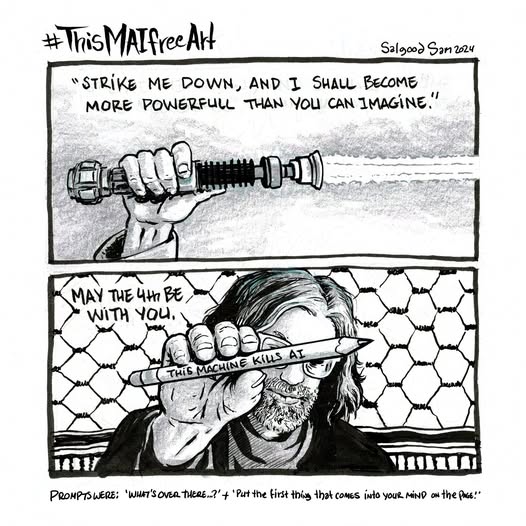
Art by Salgood Sam
Aviv Or co-creator of Crystal Heart, and artist on Critical Role: The Tales Of Exandria II: Artagan and Ghostbusters: Dead Man’s Chest from Dark Horse Comics: The thing that irks me the most is when artists use Generative AI. I don’t expect the average person on the street to understand the intricacies of intellectual property, or to consider what it takes to create a single illustration, not to mention a comic; they see a magical button that can spit out a pretty picture and they press it. But when fellow (and I stretch the word fellow very thinly here) artists use it, they must be doing so with an understanding of the grift behind it all. They must know that massive amounts of their peers’ artwork were taken without permission or compensation, stripped of their original intent and fed into the algorithm. They must be familiar with the disdain gen-AI moguls and its eager proponents have for artists. They must be able to see the road this technology is taking us down, of devalued human creativity and willingness to accept regurgitated slop as “art”.
One excuse I often hear is of the “if you can’t beat them join them” variety. “Generative AI is here to stay,” they claim, “so we’d better get on the wagon early if we don’t want to be left behind.” But it is that collective getting on the wagon that is fueling the wagon and empowering its drivers (I don’t know how wagons work, I’m an artist)! We don’t have to jump on every new fad or tool to make sure we’re relevant. There is strength in standing our ground and sticking with our beliefs and ethics, even if it means we won’t be able to join whatever meme is currently sweeping social media. There is value in how and what we create as human beings, not just in how quickly we churn it out.
I have not seen a single comic generated by AI that can hold a candle to anything created by a human. The algorithm can throw together shapes and colours, often in a visually pleasing way (thanks to all the uncredited artists who thoughtfully combined those shapes and colours to begin with), but it does not understand storytelling. It doesn’t get acting or expressions. It has no sense of pacing, or humour, or emotion. It has not seen the movies and read the books and heard the music and felt the grief and experienced that one magical summer holiday that all come together into a comic created by a person.
Comic artists will always create comics because we have that burning in us, the need to tell a story in pictures. But in the real world, for artists to be able to tell the stories they want to tell, and still be able to eat occasionally, comics needs to thrive as a financially viable industry. And unfortunately the people who lead industries or decide whether they’re viable are often more interested in how many comic pages can be churned out over a tax period, rather than the quality or intention that goes into them. The money people will always gravitate towards the tools that cut down costs, even at the expense of the humans doing the work, or the artistic integrity of the work itself. So it’s up to us artists to fight for it: to show the average person on the street why human-made art is important and valuable; to stand in the way of huge corporations that are happy to exploit us; to keep creating in the face of it all. We might never be able to beat them, but we sure as hell shouldn’t be joining them.
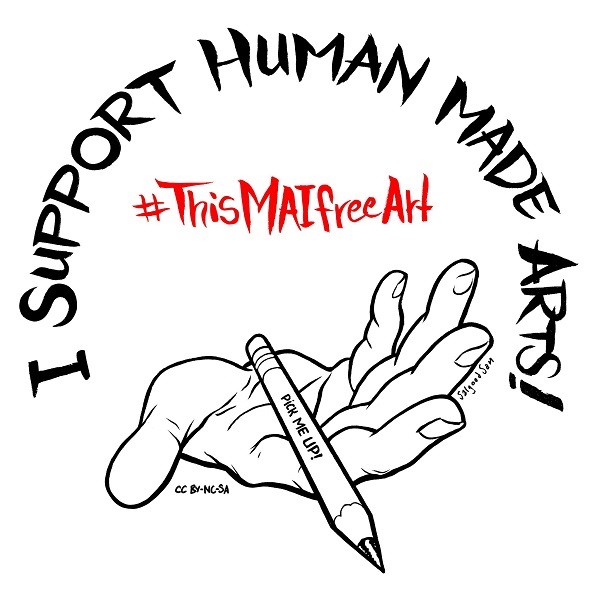
Art by Salgood Sam
Joey Esposito, writer The Pedestrian (Magma Comix): Comics is a tactile medium that is the closest someone can get to seeing an artist’s vision on a page. It goes directly from their brain, to their pen, to the page (or tablet). It is an act of intense collaboration, working hand in hand with the other artists involved — writers, inkers, colorists, letterers, editors, designers — to create something that is the result of millions of micro decisions and original thought coalescing into something unique that has never existed before.
All of that goes away if someone makes a comic using AI at any level. It has no original thought, no personal experience, no emotional connection. It does an approximation of what it thinks the query is looking for, using stolen art to mash some piece of shit together. It is pathetic nonsense and has no place in comics or any other art form.
One of the most common questions most professional creatives get is “where do you get your ideas?” Literally anywhere. Ideas come from being a person and observing the world around you. Ideas are meaningless and dirt cheap. Having a good idea makes you a human with a brain, but not an artist. An artist synthesizes ideas and gives them value through compelling narrative or visual aesthetic, or in comics, a combination of the two. If you cannot do that work to express yourself, why should anyone waste their time reading it? “Artificial” is the key word in “artificial intelligence” — nothing it offers has any tangible value or originality.
The discussion continues next week with thoughts from more commentators. If you’d like to join in the conversation by contributing some thoughts to this series then please see the talking points guidelines here.





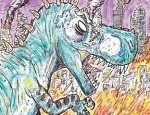
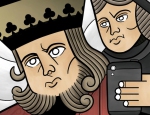
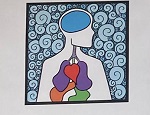

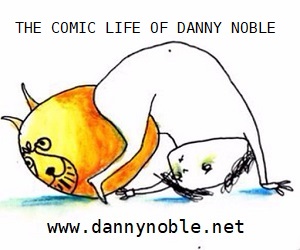

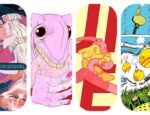
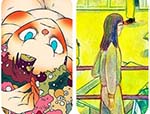
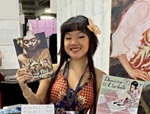
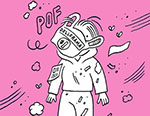
Powerfully human stuff. Great job
The investigative committee will begin its work, but opposition parties continue to push for a more targeted probe that could lead to criminal charges.